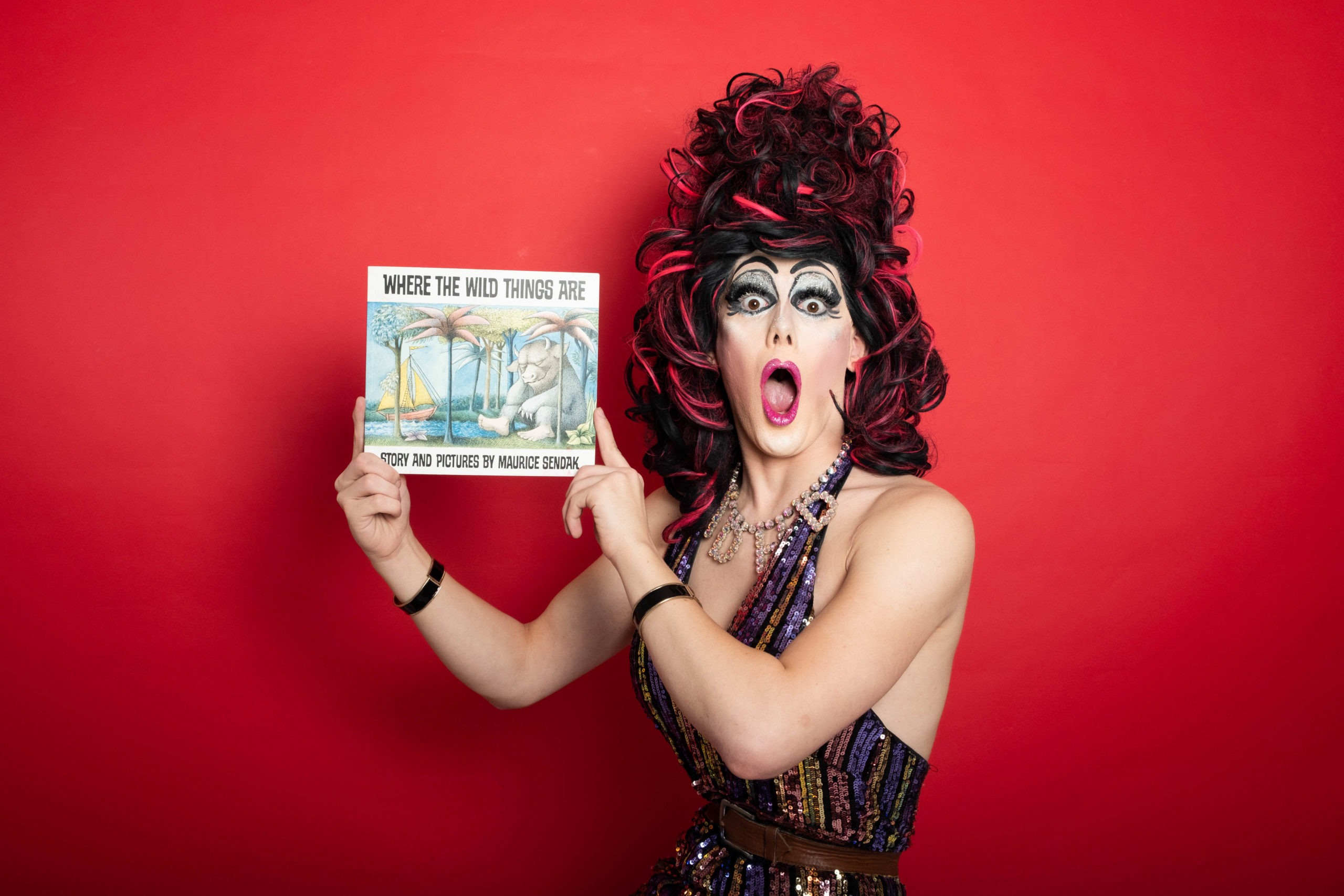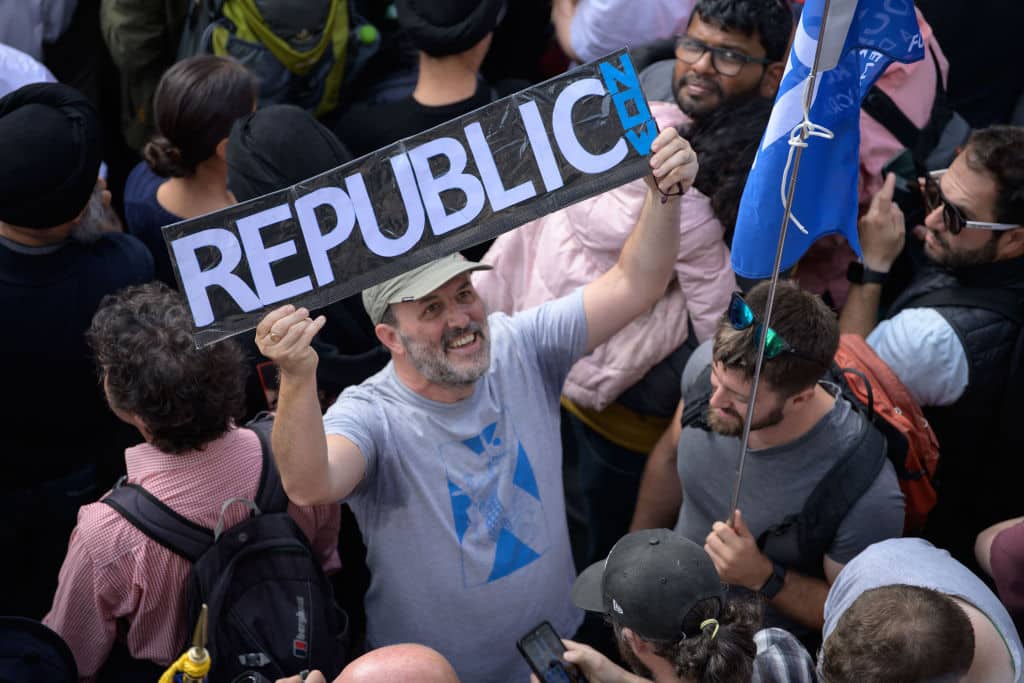Drag queen called ‘groomer’ by vile protesters says anti-royal arrests expose a double standard

An anti-Royal demonstrator protests outside Palace of Westminster, central London on September 12, 2022. (MARCO BERTORELLO/AFP via Getty)
A drag queen who faced death threats from far-right protesters says it’s “insulting” to see police arrest anti-royal demonstrators when they did nothing to protect her.
Aida H Dee travels the UK reading books to children in libraries as part of her Drag Queen Story Hour initiative.
In recent months her events have been targeted by far-right protesters who threatened to kill her, called her a “paedophile”, and made children cry.
Police forces have done little to protect her – Aida says one officer told her people are only arrested for breaching the peace “as a last resort”.
That’s why she was so horrified to see anti-royal protesters arrested or threatened with arrest following the death of Queen Elizabeth II and the ascension of King Charles III.
“I’ve had protesters turning up to my personal address, protesters outside libraries, inside libraries, protesters making children cry, shouting homophobic slurs,” Aida H Dee tells PinkNews.
“It was targeted – they followed me around the country calling me a paedophile and groomer because I am a queer person reading LGBTQ+ stories.”

Founder of Drag Queen Story Hour UK Aida H Dee, known off-stage as Sab Samuel. (Sab Samuel)
A number of anti-royal protesters have been arrested since Queen Elizabeth died. Two people were arrested in Scotland while a woman was moved away from the Houses of Parliament after she held up a placard saying “not my king”.
In Oxford, a man was arrested for publicly asking “who elected him?” in relation to King Charles III.
For Aida H Dee, the arrests prove something she’s suspected for a long time: “It’s one rule for us, another rule for them.”
Most of the far-right demonstrators who turned up to her story hour events were “absolutely” breaching the peace, she says – but none were charged.
“I’ve had death threats, people threatening to throw acid on my face. My protesters breached the peace in every sense of the word.
“I feel insulted.”
Watching the police arrest anti-royal protesters while no action was taken against the far-right demonstrators at her events has made Aida feel like she can’t trust the authorities.
“I think the real problem we’re looking at now is actually how much trust are we putting into the police to uphold the law in a respectful manner,” she says.
She adds: “There are discrepancies. There is a clear agenda.”
On Monday (12 September), Aida H Dee and her boyfriend were targeted in Cardiff by two men for holding hands in public. The men threatened to kill her, she says.
View this post on Instagram
She plans to report the incident to police, but doesn’t expect them to do anything about it.
“I’d bet a million pounds that nothing will happen,” she says.
“But for the sake of statistics and for the sake of them knowing about it, I will tell them.”
People have the right to protest the monarchy, barrister says
What’s peculiar about the police arresting anti-royal protesters is that there appears to be little legal basis for doing so in the majority of cases.
Paul Powlesland is a barrister at Garden Court Chambers. A police officer threatened to arrest him under the Public Order Act on Monday (12 September) after he held up a blank piece of paper in London.
The officer told Powlesland that “someone might be offended” by the blank page.
“I was expecting it to be honest,” Powlesland tells PinkNews. “I saw a person being led away with a sign earlier on and in these circumstances it’s important to fight for free speech.”
He says there’s “nothing specific” under the law that would allow somebody to be arrested for holding up a blank piece of paper in public.

A anti-royalist protester in the crowd during a Accession Proclamation Ceremony at Mercat Cross. (Wattie Cheung – WPA Pool/Getty)
As far as Powlesland is concerned, it’s not a criminal offence to say “not my king” or “down with the monarchy” in public. The outlook is less certain for those who use profanities in their protests – holding up a sign saying “f**k the monarchy” could result in criminal charges.
However, Powlesland is clear it’s not a criminal offence to express anti-royal sentiments in public – as long as those protesting avoid profanities, they should be fine.
The arrests of anti-royal protesters is further proof for Powlesland that there are clear discrepancies in the ways police are responding to violations of the law.
“They’re there to protect the system and the powerful,” he says.
“When it comes to protecting ordinary people their resources are always limited, but when it comes to people protesting the royal family it’s a different matter.”
Protesting in the UK has become even more legally dubious ever since the Police, Crime, Sentencing and Courts Act 2022 came was enacted in April. The law gives the police more power to police “unacceptable” protests.
However, even with those enhanced powers, most experts, free speech organisations and human rights groups agree that the police shouldn’t be arresting anti-royal protesters.
“Protest is not a gift from the state, it is a fundamental right,” said Jodie Beck, policy and campaigns officer at Liberty.
“Whoever you are, whatever your cause, it is vital you are able to stand up for what you believe in without facing the risk of criminalisation.
“It is very worrying to see the police enforcing their broad powers in such a heavy-handed and punitive way to clamp down on free speech and expression.”
Clive Stafford Smith, a human rights lawyer, noted on Twitter that people can be arrested for “abusive words or behaviour” under the Public Order Act.
He also pointed out that, under the Treason Felony Act of 1848, anybody who tries to deprive the British sovereign from the “royal name of the imperial crown” could face charges.
While that act remains on the statute book, it is no longer enforced – but its very existence is indicative of the deeper problems facing those who believe the monarchy should be abolished.
In a statement, a spokesperson for the National Police Chiefs’ Council (NPCC) said: “The ability to protest is a fundamental part of democracy and it is a long-established right in this country.
“We know some people want to protest on a range of issues during this time of national mourning, and officers must balance these rights against those who wish to grieve and reflect.
“We have issued guidance to forces on how they should do this, in order to ensure a national consistency of approach.
“Policing strives to ensure decision making is consistent and fair, and is accountable to the law. Ultimately however, each event or protest has to be assessed on its own unique circumstances.That assessment does not include the cause or issue for the protest – all groups or causes are treated impartially.”
Stuart Cundy, deputy assistant commissioner at the Metropolitan Police, said they were aware of video footage recorded by Powlesland of his encounter with a police officer.
“The public absolutely have a right to protest and we have been making this clear to all officers involved in the extraordinary policing operation currently in place and we will continue to do so,” Cundy said.
“However, the overwhelming majority of interactions between officers and the public at this time have been positive as people have come to the capital to mourn the loss of Her Majesty the Queen.”

